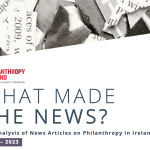
Philanthropy coverage in Irish media lacks impact, says study
August 9, 2023
Insights from the CEE Fundraising 2023 Sharing Experience seminar
August 9, 2023EFA is among a coalition of organisations to have sent a paper to the European Parliament this week, arguing for the exclusion of public benefit crowdfunding platforms and service providers from the category of obliged entities under the EU AML/CFT Regulation.
The paper is co-signed by the EU AML NPO Coalition, which comprises Philea (Philanthropy Europe Association), Civil Society Europe, the European Center for Not-for-Profit Law, and Human Security Collective, as well as EFA.
With the EU’s Anti-Money Laundering and Countering the Financing of Terrorism Regulation currently under negotiation, the EU AML NPO Coalition members have submitted the paper because they consider the risk of abuse to be low for public benefit purposes crowdfunding platforms and crowdfunding service providers established by nonprofit legal entities. This assessment is based on available official reports and other evidence.
Instead of including public benefit crowdfunding platforms and service providers under the category of obliged entities, they argue that whether or not to exempt providers of these crowdfunding platforms could be left to the discretion of Member States. This, the paper states, would be appropriate “because of the proven low risk posed by the nature and, where appropriate, the scale of operations of such entities.”
The coalition sets out four key arguments in detail for excluding public benefit crowdfunding platforms and providers, which are:
- The evidence of the (low) risk of misuse for terrorism-financing for charity / public benefit-based crowdfunding;
- The lack of a definition of crowdfunding service and crowdfunding service provider(s) in the Commission proposal;
- The need to consider already existing regulation and take fundamental rights into account; and
- The impact of considering public benefit crowdfunding service providers as obliged entities.
Moreover, they add:
“We consider that the exclusion of these entities from the list of obliged entities – and, therefore from the additional burdensome requirements required for obliged entities – would reflect the different role of public benefit purpose crowdfunding established by NPOs as legal entities, also achieving the positive effect of helping NPOs establish or increase donations.”
The paper will also be sent to other EU institutions involved in the negotiations in the coming days.
Picture by Florian Pircher from Pixabay




